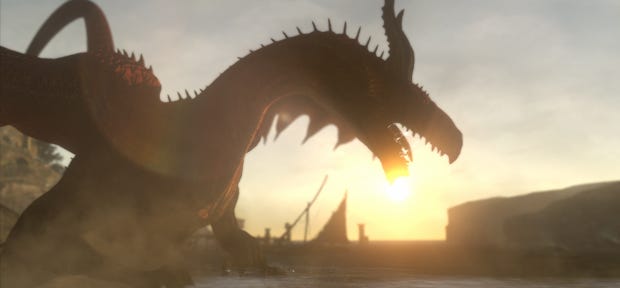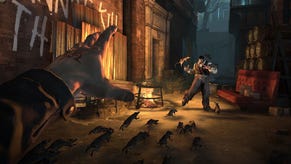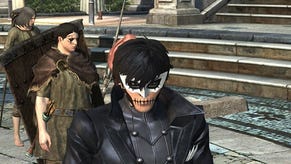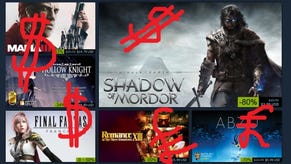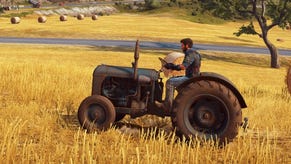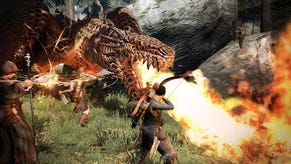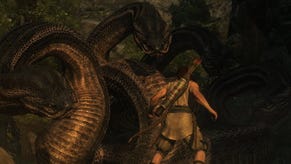Wot I Think: Dragon's Dogma: Dark Arisen
Soul Survivor
Originally released on PS3/Xbox 360 back in 2012 and then updated to Dark Arisen in 2013, Dragon's Dogma [official site] is a tough game to pigeon-hole. It's a bit Dark Souls, a bit The Witcher, a bit Skyrim, and a bit Shadow of the Colossus. But is it a bit good, especially coming to us after a generational upgrade? Here's Wot I Think.
Speaking as the world's worst Dark Souls player, the mere idea of playing Dragon's Dogma gave me a deep case of The Fear. Especially for a review. "Well, the first boss is quite impressive," I could imagine myself typing in shame. "I'm sure whatever he's guarding is probably pretty neat too. Um. Metacritic says people liked it!"
But that's reputation for you. Dragon's Dogma doesn't have too much Dark Souls in it, as promised/threatened. A little of its flavour, yes, but only as part of a much bigger recipe, and even then, served up from a more compassionate point of view. Where Dark Souls takes pride in how much it's going to grind your face through a steel mesh, Dragon's Dogma at least strokes your hair and makes soft, soothing noises during the process. Yes, it starts by demonstrating exactly what happens when a plucky peasant decides to take on an elder dragon with nothing more than courage and a rusty sword - to whit, "ouch" - but after that, it's got a sense of mercy. It understands the concept, anyway. It's not actively a dick to you. Usually not. It even has an easy mode!
It can be an oddly relaxing experience for a game that will happily end you with an arrow from a distant shadow, especially early on, or for the crime of thinking that the first quest you get in the first town is something to actually do now instead of putting on the back-burner for a few levels. Dragon's Dogma doesn't hold with recommended quest levels or colour-coded enemies. If you hit a guy and your sword clangs off as if to say 'haha, no', it's time for some energetic cardio and a note to come back later with a bigger sword or tougher friends. There's always something else to do for XP, including Witcher style monster hunting quests and smaller pest control contacts.
Part of the mood there comes from the main story, which is the least interested I've seen an RPG been in its own tale since... well, Fallout 4, but this game did get in there first. It's bizarre. You get killed in the intro by a dragon, and then yes, some people will bring that up in the following hours. Mostly though your continued existence and new abilities may as well have come in the mail from the Famous Adventurer's Correspondence School. What's that? You're an RPG hero now? Well, here's a long list of all the Shit To Do that's just been building up over the last few years. Monsters in the town well, bandits in the hills, ancient temples under the capital city, and if you wouldn't mind escorting this cart, that'd be swell. We'll get to your big destiny eventually.
But it does play well, and simply cruising around and getting stuff done is an enjoyable experience. Despite a few oddities in the controls, notably the lack of a target lock, and scenery that loves to get in your way, the raw melee feels great. The Fighter's charge attack quickly became a personal favourite for its speed and the raw 'thunk' of knocking a small group of enemies over like skittles, though there's a big bag of classes to choose from (which you can unlock and switch between in the capital city) with a ton of other cool abilities like levitation, hurling fireballs, imbuing weapons with elemental charges, and knocking foes high into the air and making it literally rain men, hallelujah. Also the occasional wolf, though I'm not sure that's as welcomed.
Bigger enemies also offer a mini-version of Shadow of the Colossus' main gimmick in letting you climb onto and around them, to hack at the different parts of a chimera or try to slice one of a hydra's heads off, though honestly I found this very fiddly and annoying with the camera constantly swinging around and never feeling very precise. I generally preferred the smaller scale tactics, like cutting off saurian enemies' tails to make them more vulnerable, or rushing to take out archers before they could pepper the battlefield with fire. It's not as novel, but it feels far more satisfying.
The larger enemies also tend to take forever due to needing the HP to endure four characters beating on them simultaneously, with all the weapon effects and movement making the battles irritating rather than epic. A fight with a golem really wore me down, not for being difficult, but for his last voonerable spot (a subtle giant pink crystal) being in his clenched fist and so almost impossible to actually land a hit on.
What's that though? Four characters? Yes, Dragon's Dogma's biggest gimmick/twist though is that you're never alone, and without having to team up with smelly humans. As the Arisen, to use the game's rather generous term for 'he who got totally owned by a fucking dragon', your main power is control over a race of people called Pawns. You create one from scratch, much like your own character, and can rent two more to create a party of four - rented incidentally from other players, which boosts their power and takes gifts across to their own games, though all that is handled automatically via a magical nexus thing rather than forcing you to deal directly with other players.
It's nowhere near as interesting as the way that Dark Souls tries to integrate online action into a single player game, though on the plus side, it does mean all interactions are positive - aside from the tedious bit every time you sleep and it has to upload your Pawns to the online meat market for other players to quest alongside. Even so, Pawns are a very clever concept. Those at your level are free, so you're never left without. You can pay to recruit higher level ones though if you need assistance for a specific area, and there's some subtleties to them beyond just the skills their creators chose for them.
A Pawn who has done an early mission to get through the sprawling Witchwood for instance learns the route, and so can automatically guide any player who recruits them to the end without any messing about. Each player can also customise their AI by playing and giving instructions on how they should behave, as well as kit them out with equipment and a custom load-out of traits and attacks. You'll never mistake them for a crafted group of actual characters, but they're not just robots in boob-plate either.
Your own created Pawn sticks with you for the whole game, levelling up alongside you. The other two don't, encouraging you to keep swapping them out for new ones and creating new party balances as you see fit. Having some trouble with an area full of archers? Go grab a couple of your own. Need muscle to take out an Ogre? Swap those archers for two hulks of beef, or pay extra for a ringer. The catch is that if you lose these rentals in battle, they're gone, and you have to go recruit someone else to fill their spot.
It's not a perfect system, starting with the fact that while Pawns aren't quite dumber than rocks, it's still too equal a fight for a party you're supposed to rely on to watch your back and not, say, explode barrels in your face. The attempt to make them feel like real characters by having them chat and comment on the surroundings also quickly goes from cute to infuriating. Yes, wolves attack in packs. Got it. Yes, the road is indeed splitting, but I'm sure we'll go in the right direction because we packed Mr. Map. At least very occasionally they have something worth saying, and they're not dicks when you fail miserably for the tenth time. So, Pawns: 1, Humanity: 0.
Despite the flaws though, they help make Dragon's Dogma a much more endearing place to spend time in. That tends to be the pattern throughout the experience, really, with the general rhythm of going out and exploring becoming oddly compelling despite all the bits that have been done better since it first came out back in 2012.
The world for instance isn't a patch on The Witcher III, being mostly bland rolling hills speckled with such economic use of a few stone textures for cities and spots of civilisation that it's as if Capcom was on a recycling kick throughout. There aren't many memorable characters or truly great quests. The Dark Souls element of challenge soon fades away, until by mid-game taking out whole teams of bandits feels more like popping bubble-wrap in both difficulty and satisfaction broken up with occasional sudden bursts of challenge to the back of the head instead. Hell, after a while I even stopped being massively irritated by the use of renaissance faire talk, which isn't as bad as Two Worlds back in the day, but does act as a reminder that Ultima was the last and very last series allowed to talk like that without getting a smack on the nose.
Very little is memorable, but much is more-ish, with just enough moments speckled amongst the heroic day-to-day. The sudden appearance of a griffin outside the capital city for no particular reason. Encountering pawns on the road and casually trading up. Fleeing from a slightly comically rendered but more importantly completely unstoppable tentacle assault. A handful of moral choices and hidden things to discover, all of which soon counter moments of grr like being invited to see the Duke, and promptly being arrested by the night's watch that has hitherto not even been mentioned, or realising too late that yes, there is fast travel and that all that walking back and forth was more or less unnecessary, if quite good for the bonus XP.
Later in the game of course things do get jacked up a notch - in particular with a place called Bitterblack Island, which comes across as Dragon's Dogma sighing a bit at its own reception and going "You want Dark Souls? Here's your goddamn Dark Souls." I've not spent much time in it myself because while it's available from the start of the game, that's in the same sense that you can technically go skydiving with a concrete parachute. It's one giant dungeon haunted by Death, and while you can apparently cheese it with throwable explosives and ludicrously expensive Pawns at a pretty early level, you're looking at being about Level 50 before heading over to play properly.
This being Dark Arisen rather than raw Dragon's Dogma, some of the harder core elements of the original have also been toned down - in particular, that fast travel thing. The main locations now have portals, and while supposedly you need limited 'Ferrystones' to hop around between them, at some point I apparently collected an unlimited use one without realising it. Probably my bad, but it was in an item storage screen I'd never looked at before, which went nicely with how little the game wanted to even acknowledge the idea that it even has fast travel in the first place. You can almost hear it sniffing whenever you use it. Too bad though, because repeatedly walking back and forth across the map through the same enemies takes sodding ages.
Port-wise, this is a decent job, starting with the fact that it has no problem with alt-tabbing in and out. Hurrah! I don't have a system that lets me test its 4K support, but it has it, the action isn't capped at 30FPS, and it ran smoothly throughout. You can see its age, or to be more accurate, its generation target in quite a few of the details, with the bland landscapes being the biggest reminder. Its monsters can still impress though, from the wobbly bottom fat as you stab an Ogre to the sprawling snakes on the back of its chimeras when they make their occasional appearances. It's no The Witcher 3, obviously, but it holds up better than a lot of JRPGs that come our way after a protracted gap. There's no option to play with Japanese audio though, if you prefer the subbed experience over the flat, though not painfully terrible English voices.
Control-wise though, while you can play with a mouse and keyboard, I'd stick with a controller - I played with an Xbox 360 one - as it's by far the best way to handle the multiple attacks you build up on each weapon/the lunge that I spammed more than probably intended. Stab for you! Stab for you! Heck. Stabs for everybody!
Dragon's Dogma's big flaw is that in trying to draw from so many different inspirations, it can't help but fall short of them. Even if we ignore The Witcher 3 out of deference to its release date, it's far more a Risen than a Skyrim, it doesn't commit enough to really be Shadow of the Colossus in anything more than a 'the climbing mechanic is a bit Shadow of the Colossus', its monster hunting is no Monster Hunter, it doesn't have the raw focus and deep sublety of Dark Souls, and what little plot it offers after the intro comes so late as for the set-up to be forgotten. It involved a dragon and... a dog's mother? Something like that. Oh, hey, killed enough ogres to unlock a reward!
What it offers though is a solid combat system backed up with enough different flavours, little moments of triumph, pats on the head and surprises amongst the very, very quickly familiar terrain to be compelling, like a big bowl of popcorn sprinkled with chocolate. It's unfortunate that as a hybrid, The Witcher 3 does so much more with a lot of the same elements, including trying to make monsters worthy of respect and nailing the feel of being a wandering hero taking odd-jobs in a much prettier world, because it is ultimately the game that casts a shadow over both good and bad.
However, that doesn't mean Dragon's Dogma doesn't make a decent fist of it as well, with the slightly off-beat quirkiness that characterises many JRPGs and no shortage of content to devour, work through, discover, and enjoy... and perhaps even feel good enough about to consider giving big bad Dark Souls one more try after all.
Maybe.
Dragon's Dogma: Dark Arisen is available on Friday.
